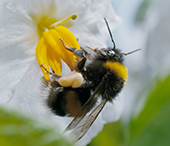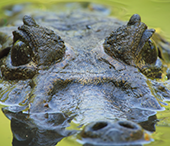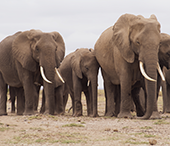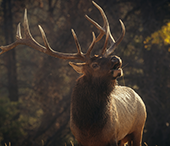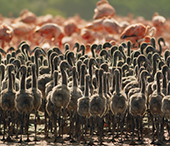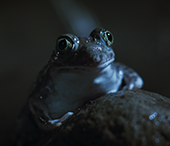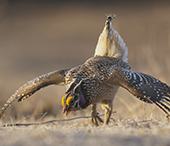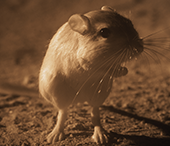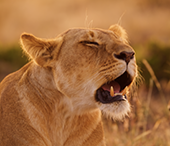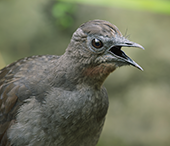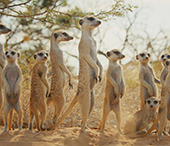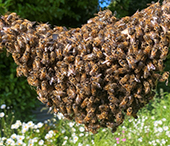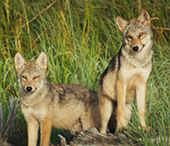FIMS News
Contact Information
FIMS Communications
Becky Blue
Email
519-661-2111x88493
FIMS & Nursing Building
Rm 2060C
Tapping into a Secret World of Sound

Spring 2024
With the plethora of streaming and specialty channels currently available to TV watchers, it seems that documentaries are easier to find – and more popular – than ever. Companies like Netflix have pulled in large audience numbers with original productions. In Canada, CBC GEM has provided a new home for the Canadian Broadcasting Company’s back catalogue, along with many new titles.
Documentary film as an art form has been around since the 1920s. What, if anything, has changed about making documentaries in a modern world shaped by instant access to entertainment and information? Is there anywhere new left to go?
Dugald Maudsley, Creative Director at Infield Fly Productions, is still finding new ways to tell stories, using groundbreaking techniques and updated approaches. An alumnus of Western’s Master of Arts in Journalism program from 1986, Maudsley is a veteran, award-winning filmmaker telling “stories that make a difference.”
 His most recent work, Secret World of Sound, hosted by Anthony Morgan, premiered on CBC Docs and CBC GEM in mid-February and seeks to give its audience new insight into the complex and vital role sound plays in the lives of wild animals.
His most recent work, Secret World of Sound, hosted by Anthony Morgan, premiered on CBC Docs and CBC GEM in mid-February and seeks to give its audience new insight into the complex and vital role sound plays in the lives of wild animals.
“Virtually all natural history documentaries focus on beautiful pictures - sound plays second fiddle,” says Maudsley.
Co-producing with relative newcomer, but innovative trailblazer, Humble Bee Films in the UK, Maudsley looked to flip the equation to give the audience something they hadn’t seen – or heard - before.
“We still have beautiful pictures, but with sound at centre stage we’re able to enter a hidden world – hence our title Secret World of Sound – and discover how animals use sound in extraordinary ways to find a meal and avoid becoming one, win a mate and fight off a rival and, as a baby, survive one of the most vulnerable moments in life.”
Maudsley says the three-episode series, filmed in 4K ultra-high definition and using groundbreaking audio techniques, provides an immersive audio experience for viewers. The slower pace of production for documentaries affords an opportunity to pioneer new techniques such as the sound work featured in Secret World of Sound.
Though he has lots of hard news to his credit, having worked as a reporter and correspondent in New Zealand and Australia earlier in his career, Maudsley appreciates that documentaries give him the ability to dive deeply into his subject matter. With many of his projects focused on science and nature, the ability to slow down means a stronger finished product.
“As a documentary filmmaker you have two things a news journalist doesn’t – time and space. Even when I was traveling the world for ABC Australia’s current affairs program Foreign Correspondent, we only had a few days to shoot and a few days to edit. With documentaries you can (and need to) research for months, spend weeks in the field shooting and then months editing. Secret World of Sound took nearly three years to make,” he says.
Images from Secret World of Sound
Maudsley also doesn’t shy away from difficult topics. While Secret World of Sound makes use of new technical approaches to capturing sound, some of his other recent work required him to reconsider how he approaches and constructs a story. Some of his documentaries tackle subjects that have become public flashpoints, particularly online, where misinformation, disinformation and conspiracy theories take up vast amounts of space and people argue about whose truth is the right truth.
Infield Fly Productions released a pair of films in 2022, one dealing with carbon and climate change, and the other the race for a COVID-19 vaccine. Both were nominated for multiple awards. In the case of Curb Your Carbon, produced for CBC’s The Nature of Things, Maudsley explains that facing polarized audiences, they try to focus on stories that are positive, inspirational, and that offer workable solutions to people. And it doesn’t hurt to have popular Canadian movie star Ryan Reynolds narrating the project, either.
“In the current climate, these stories do well, even films about topics that suffer from intense disinformation like climate change,” he says. “Rather than focus on the problem, we centered our film around solutions, made it funny and, I think, took it out of the political realm.”
Working regularly with The Nature of Things also helps, says Maudsley, as the long-running show has a trusting and dedicated audience built over six decades of airing on the CBC.
“It has inbuilt credibility, an audience that is interested in ideas and wants to see those ideas based in fact. That’s the kind of film we like to make.”
Despite the challenging social and cultural conditions facing filmmakers today, Maudsley encourages current students interested in documentary-making to pursue it as a career. There are opportunities on both the creative side and technical side of production for people with the right skills.
“Start as a junior researcher and wow them with your understanding of story, skill at finding the right talent and ability to bring it all together in a written brief,” he says. If you’re more interested in the technology side, he suggests signing on as a production assistant or camera assistant to learn the craft.
“It is a field worthy of your efforts. It is a wonderful form of storytelling.”
Even though Maudsley graduated with his degree in journalism in 1986, the lessons he still carries with him from that time would resonate in 2024 with current students in the Master of Media in Journalism & Communication (MMJC) program. Some things change; many things don’t.
“[Journalism instructor] Mac Laing on the print side taught me to never misspell a person’s name,” says Maudsley, recalling what lessons have stayed with him.
“On the radio side, Ken Bambrick impressed on me the value of every word. And Peter Snow on the TV side taught us the value of thesis and focus when defining a story.”
Though technology, ideas and subject matters have evolved over his decades in the field, the key to successful storytelling remains the same.
“Thesis and focus are brilliant tools for defining your story and staying on track as you tell it.”

